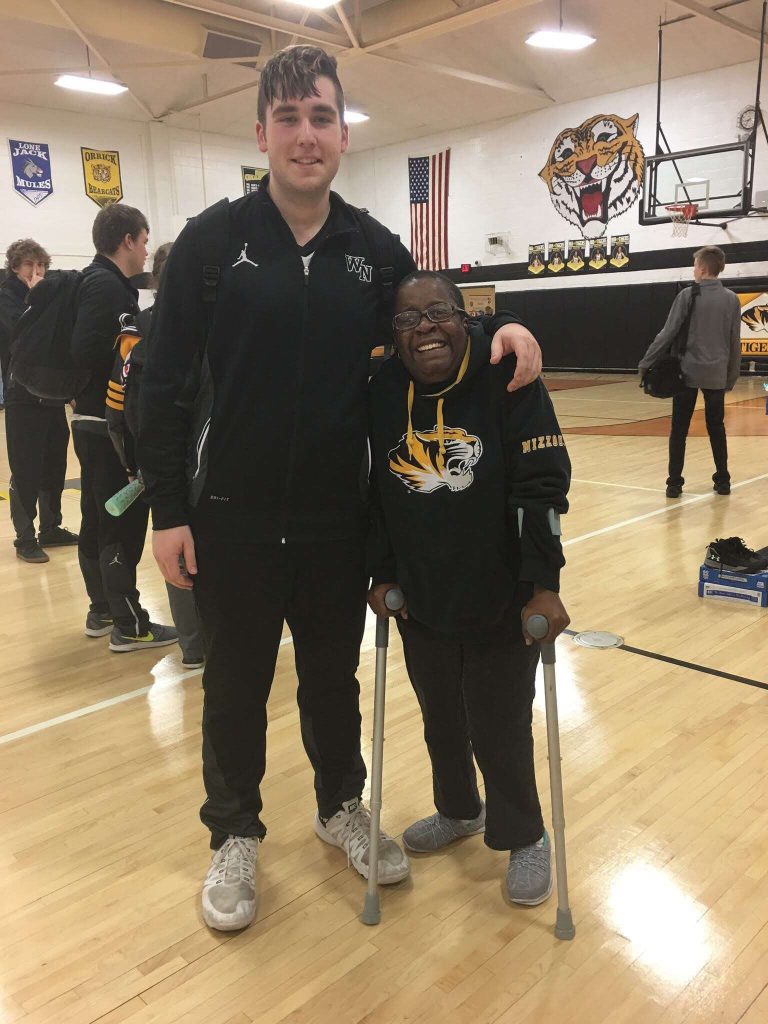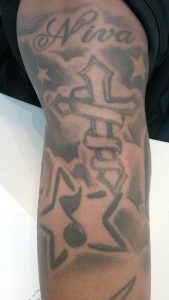
“So, where did you grow up?”(19:44) I asked Michelle DeWeese, a woman I consider a good friend and a role model. “I grew up in Denver, Colorado. It was a big metropolitan city where I was exposed to Black, White, Chinese, single parents, married parents, rich, poor – I saw a little bit of everything, and that was to my advantage.”(19:56) Michelle is different than most as she tends to look at the bright side, even when things have not necessarily gone her way. Intrigued, I asked, “What words would you use to describe your differences?”(00:09) Michelle then went on to tell me, “My handicap can be described as a birth defect, that was discovered when I was four years old, and the technical name for it was cerebral palsy.”(00:13).

When I first saw Michelle, I was eleven years old, sitting in church with my mother. Michelle walked by, using two crutches, and moved all the way to the front. I asked my mother why she had to use crutches, and this is the first I had known of anyone with a birth defect. My mother explained to me that there were people that had certain limitations and could not do everything that I could. She told me to be thankful for what I had and not to treat people with handicaps any differently than I would treat anyone else. I thought, “How did she play sports and run around with her friends when she was a child?” At that moment I was very thankful for the childhood that I had lived.

Michelle loves to watch sports, especially when the people she loves are involved. When I asked her about her childhood, she still gave me no negatives. She said, “I had a very positive experience, because being highly verbal, I was a hospital representative for, I guess you would call it poster-child type stuff, for the children’s hospital in Denver, Colorado.” (2:20) While she spent quite a bit of time in the hospital dealing with six surgeries over ten years in her childhood, she has not allowed that to hinder her ability to make friends, and enjoy life. Michelle explained to me that she had three older siblings who didn’t treat her any differently, and that helped her fit in. I personally did not grow up around anyone that was too different from me, and I wondered if she had faced any adversity at school because of her race, African-American, or because of her disability, but again, she gave me only the positive side of the story, “I was in a school for handicapped children and I was not in a mainstream public school. There were nurses and an underground tunnel to the hospital, and there were rest periods, and children of various illnesses, so that’s who I was around most of the time.” (1:03) When I see people with differences, I think of all the challenges that go along with it. I think of people that have been through tough times just because of what they look like or what they believe in. In a book for the history course called Maus by Art Speigleman, Artie’s father survived the Holocaust and suffered through several problems with guilt even after the oppression was over. I wondered why Michelle wasn’t telling me how bad her troubles had been, but only the good things that have come from her life. Later, I got the explanation. Michelle told me, “My mother did not allow me to accentuate my differences very much at all.” (2:20) Michelle’s mother played a huge part in the way that she carries herself. She explained to me that, “She did not let me focus on it. I was not the center of the world.” (8:10) Her mother knew that she was different, being that she was handicapped, but she also knew that her race would be an issue in society as well. “My mother did not allow my race to be a difference. She deliberately asked excellence of us, because she knew that the race issue was already there.” (17:53) I began to wonder about her mother, and why she raised her children to be so tough and to not give in to what the world told them about their differences. Michelle then explained to me, “My mother was raised in the deep South and she was mixed race. And so she saw a lot of the, if I have my history timing right, she saw a lot of the separate water fountains, black and white differences growing up than I did.” (18:33) Her mother, “set out to give us a bigger world than she experienced” (19:35).

I believe that Michelle has made the most of her life. After earning her Bachelor’s degree in Psychology, she went on to earn her Master’s degree in Divinity from Northeastern State University. Earning her degree did not come without challenges. She said, “At one point I was discouraged from getting my Masters because an administrator felt I didn’t have the money to be in the school, but I went to the school with vocational rehabilitation and ended up getting my degree.” (3:17) Despite the outside pressure, Michelle feels that the biggest challenge she faces is within herself. I believe this is true for most people. Humans have a natural need to belong to something bigger than themselves, and it can be a lot tougher to fit in when you have an obvious difference. One obvious example of this is when Jewish people were trying to find their place in Europe in the early 1900s. They were oppressed by every single group of people that they tried to fit in with. With Michelle, her challenge was not comparing herself to others. “Recognizing that dreams that I had for myself were not going to be.” (9:00) This quote from Michelle made me look at my own life and realize how lucky I am to be able-bodied and to be able to achieve the goals that I have set for myself. Michelle has not allowed her limitations to keep her down for very long. She lives independently and functions in society very well. I asked her if she had any hobbies, and she gave me a great response. Her hobbies include “going to the gym, watching people that I know in sporting events, and attending live concerts.” (24:21) I have never heard of a person with cerebral palsy being able to work out. She explained to me that going to the gym relieves stress for her. Michelle has come to watch me play basketball several times when I was in high school, and I think I finally understand why. When I asked her what her favorite memory was, she answered with this, “I think I like most of all watching you, your senior and junior year was a lot of fun. [Tears run down her face] because it allowed me to go back to high school for the good stuff. Just watching you live life, play basketball, hang out with your friends” (26:50). I believe that Michelle loved watching me so much because when she would see me running down the court, or shooting a basket, she could experience the sport through me. Michelle really showed me that being single, African-American, handicapped, or whatever difference one may have, does not mean that you can’t enjoy life. It just means that you have to try a little harder, create meaningful relationships with the people around you, and have a positive attitude along the way.




